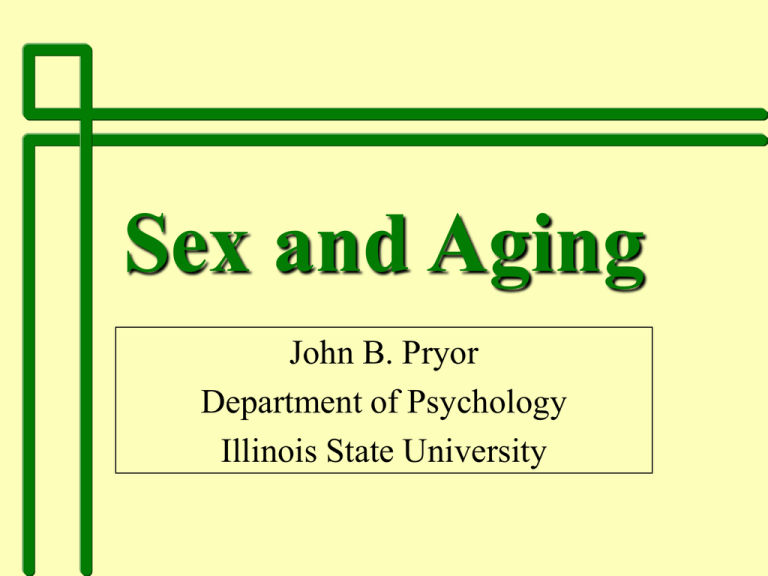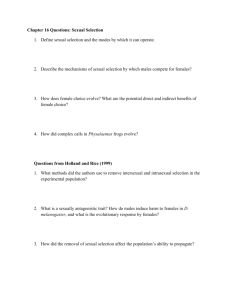
Sex and Aging
John B. Pryor
Department of Psychology
Illinois State University
A Timeline of Your Life
I. College Years
II. Your 20s after college
III. Your 30s
IV. Your 40s
V. Your 50s
VI. Your 60s
VII. Your 70s & beyond
The Questions about your Sexuality:
1. How many times do you have sex in an
average month?
2. To what extent do you enjoy your sexual
activities?
3. What types of sexual problems are you
encountering?
4. What do you like most about sex now?
5. What do you like least about sex now?
Stanley (1991) - National Survey of Families &
Households - 13,017 Adults, 807 ≥ 60 yrs. of age
53% reported sex in the last month
Correlations
Age
Education
Frequency
of Sex
Sense of Self-Worth
Marital Satisfaction
Length of Marriage
Brecher et al. (1984): Consumer Reports Survey N=4246, 42% response rate
WOMEN
Masturbation
Sex w/ spouse
MEN
Masturbation
Sex w/ spouse
50s
47%
88%
60s
37%
76%
70s+
33%
65%
66%
87%
50%
78%
43%
59%
Physical
deterioation
Availability
and interest
of partner
Sexual activity
when one
is elderly
Attitudes and
expectations
about sex
in old age
Changes in female sexual arousal
often associated with aging
Reduced
myotonia (muscle tension)
Reduced vaginal lubrication
Reduced elasticity of vaginal walls
Smaller increases of breasts during sexual
intercourse
Reduced intensity of muscle spasms at
orgasm
Pros & Cons of Estrogen Replacement
Therapy for Older Women
Pros
– May help prevent bone loss if started early
– May reduce the risk of Alzheimer’s disease
– May affect cholesterol levels & reduce heart attack risk
Cons
– May increase the risks for some forms of cancer, especially
when progestin is not also given
Testosterone production also decreases after
menopause in women
Research has found that testosterone patches may improve the
sexual function and psychological well-being of women who
have undergone surgical menopause (removal of the ovaries and
uterus).
Changes in male sexual arousal
often associated with aging
Longer
time to erection & orgasm
Need for more direct stimulation for
erection & orgasm
Less semen emitted during ejaculation
Erections may be less firm
Testicles may not elevate as high into
scrotum
Changes in male sexual arousal
often associated with aging(CONTINUED)
Less
intense orgasmic contractions
Lessen feeling of need to ejaculate during
sex
Longer refractory period
Source: The Kinsey Institute Report on Sex (1990)
Pros & Cons of Testosterone Replacement
Therapy for Men
Pros
– May enhance libido (sexual desire), the frequency of sexual
acts, and sleep-related erections
– May improve positive mood parameters, such as feelings of
wellness and friendliness, while reducing negative mood
parameters, such as anger, nervousness, and irritability
– May reduce depression
– May increase lean body mass and decrease in body fat,
increase weight and muscle size
Cons
– May increase the risks for some forms of cancer, especially
prostate cancer
– May lower sperm count (azoospermia)
– May be related to bone marrow disorders & sleep apnea
Frequent Ejaculation May Reduce
Men’s Risk of Prostate Cancer
Most men develop prostate cancer in old age
Harvard study (2004) of 30,000 health care
professionals
The cancer risk in men who reported more than
20 monthly ejaculations was 33 percent less than
that of other men
The activity may flush out a buildup of toxins in
the prostate, lessen development of tiny crystals
linked to some cancers, and improve the immune
system's response to cancer. It may also reduce
psychological tension
Will you still need me? Will you still
feed me when I’m 64? From Beatles Song
•According to Masters and Johnson 2 factors
are critical in maintaining sexual capacity
in old age:
–Good physical and mental health
–Regularity of sexual expression - “if you
don’t use it, you lose it”
Physical
deterioation
Availability
and interest
of partner
Sexual activity
when one
is elderly
Attitudes and
expectations
about sex
in old age
Living Arrangements of Americans over 65 in 2000
80
72.6
70
60
Percent
50
41.3
39.6
40
30
20
17
16.9
10
7.1
3.3
2.1
0
living with spouse
with relatives
with non-relatives
Living Arrangements
alone
MEN
WOMEN
Marital Status of Americans over 65 in 2002
90
80
79.6
79
72.6
70
60.1
Percent
60
55.3
55
married
widowed
divorced
never married
50
40
35.8
33.8
30.6
30
18.4
20
13.9
10
6.6
3.7
13.2
10.7
4.9 4
3 3
3.5
6
3.2
2.8
0
65-74
75-84
MEN
85+
65-74
75-84
WOMEN
85+
5
AARP Survey in 1999 of 1,384 Americans over 45
Physical
deterioation
Availability
and interest
of partner
Sexual activity
when one
is elderly
Attitudes and
expectations
about sex
in old age
Attitude Barriers toward Sex among the
Elderly
Stigma
of Old Age
• Sex is for the Young
• Old sex is disgusting
• Old people interested in sex are
‘Lechers’
• The double standard - old men
are dignified, old women are a
turn off
Attitude Barriers toward Sex among the
Elderly
Religious
Views
• Sex is for reproduction
Adult Children’s Resistence
• “You thwarted my sex life, now its my
turn!”
• “What about mom’s silverware?”
Changing Roles
• “Real men have erections.”






